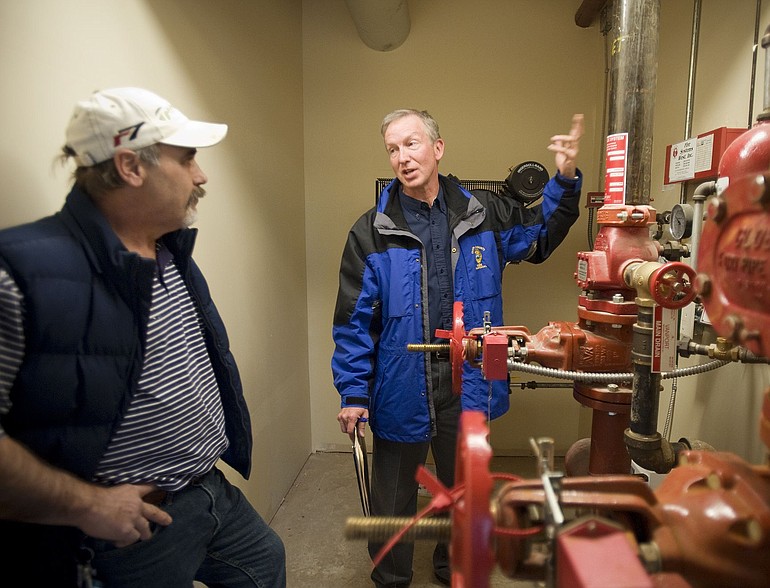Nine months after Clark County commissioners closed a $276,000 hole in the fire marshal’s budget by tripling inspection fees, they’ve gotten a tough lesson in economics.
Turns out that when you triple your fees, fewer people pay them.
“To tell you the truth, we should have probably looked through that a little harder,” Commissioner Marc Boldt said Friday. “Now we’re playing catch-up.”
The big July 2009 fee hike was billed as a necessary measure to support the county’s annual inspections of 693 restaurants, hospitals, theaters, factories and other businesses in the unincorporated county and smaller cities.
But after that hike, the delinquency rate on payment for those inspections rose from about 5 percent to 17 percent.
Lost or delayed revenue: about $50,000.
“I’ve heard people say, ‘We just can’t pay it,’” county fire marshal Jon Dunaway said. “And I’ve just heard people say, ‘We’re not happy with what you’re charging.’”
The delinquencies haven’t stopped inspections, which must happen every year. But county officials have few options to deal with nonpayment other than to send the delinquent bill to a collection agency — and then show up again for an inspection the next year whether the bill is paid or not.
What’s more, it turned out that the county didn’t need to hike fees as sharply as it did, because layoffs later drove down program costs. Even with the higher delinquency rate, the county billed for $11,000 more than the ultimate cost of its inspection program.
That extra cost was borne by the businesses who played by the rules.
Boldt said he’s pushing for a partial refund to businesses that have paid the high fees since Jan. 1.
“It seems excessive — $255 to pay somebody to go through the place, take some notes and leave?” said Ron Layton, the owner of central Vancouver motorcycle repair shop Tired Iron, whose fire inspection bill is almost four months overdue. “The way I look at it, we pay taxes for these things, and now we have to pay fees on top of these taxes.”
Layton said he’d pay eventually, once business picks up for the summer.
Hourly billing
In response to complaints like Layton’s, commissioners are planning to switch from a flat fee based on the type of business — $337 for a shop, $1,069 for a school — to an hourly fee of $130.
The less time your fire inspection takes, the less you’d pay.
Dunaway expects to switch to hourly billing this spring. A $60,000 annual general fund subsidy for the program would hold them down.
County officials predict that fees paid by businesses under an hourly system would vary. The average inspection for a small shop like Layton’s takes 2 hours, counting travel time and record updates. But it varies widely by size.
“There will be those that are paying more today than they will,” said Paul Scarpelli, finance manager for the county’s community development department. “And vice versa.”
About half the $130 per hour fee would cover travel, on-site time and off-site paperwork for the county’s six fire inspectors and deputy marshals, who earn $26.49 to $35.36 per hour.
The rest of the fee would go toward their cars, computers and administrative support.
Reason to prepare
Scarpelli said the amount of time county inspectors spend at any one business will probably vary widely.
Because businesses receive advance letters notifying them of their coming inspection, Scarpelli hopes that hourly billing will give businesses an incentive to have everything ready for review when inspectors arrive.
“If they’re better prepared, we spend less time there and their bill is smaller,” he said.
Dunaway estimated that such a move could cut inspection times by half in the largest facilities, which average more than 12 hours of work per inspection.
Both Boldt and Marty Snell, the county’s community development director, said they hope the county can avoid problems like this one in the future.
Snell said he hopes to institute regular, smaller fee changes than the county has in the past.
“As long as I’m here, I’m not going to go six, eight, 10 years without looking at fees,” he said.
Boldt said he also wants to find a way to warn his successors that if they hike fees sharply, they should expect fewer people to pay up.
“One thing that hurts the county is that county commissioners leave, new county commissioners come in, and they do the same thing over again,” Boldt said. “We’ve got to figure out a way to tell future commissioners some of our mistakes.”
Michael Andersen: 360-735-4508 or michael.andersen@columbian.com.



